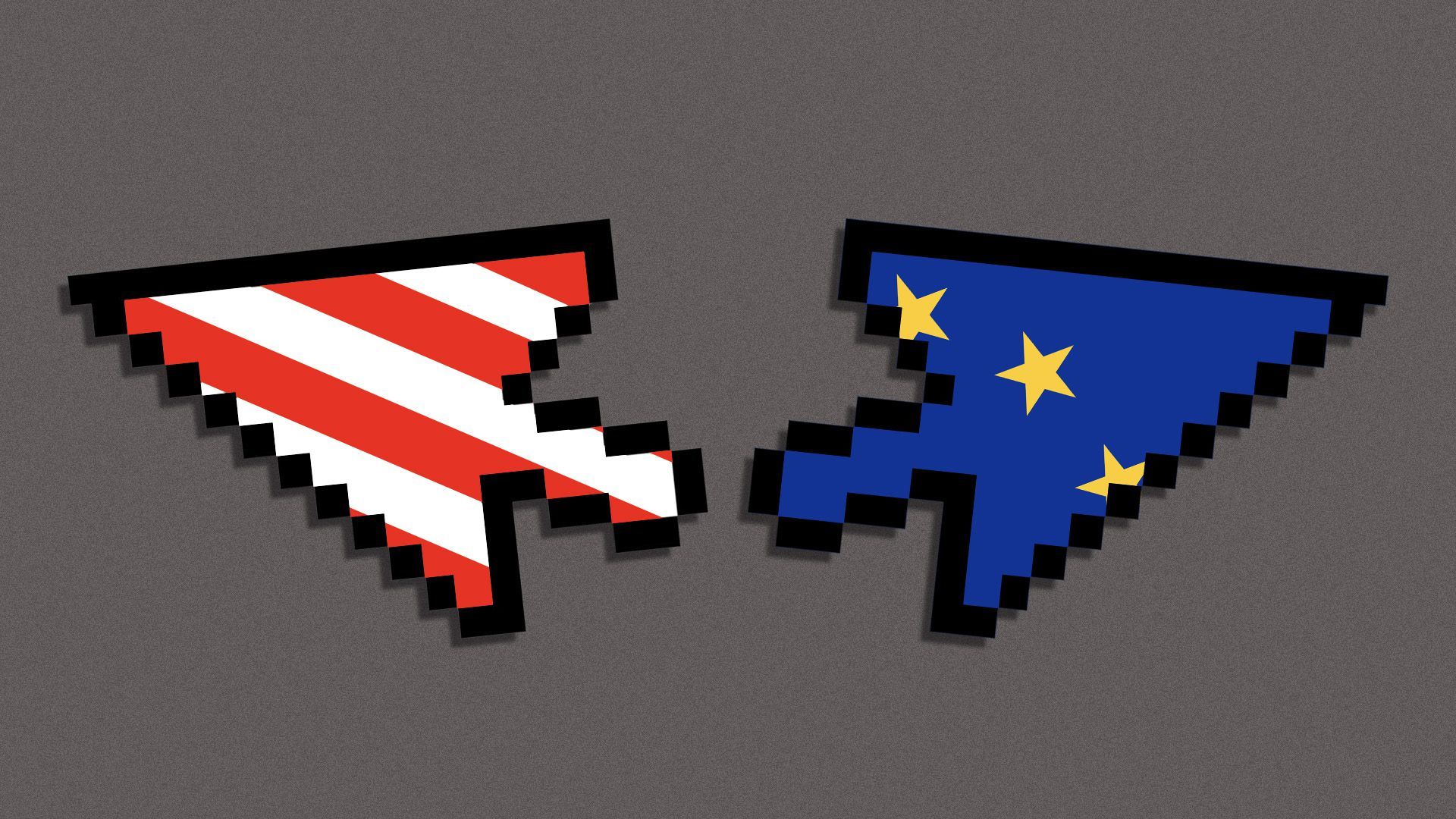
Illustration: Natalie Peeples/Axios
New fines levied by European regulators against Meta and Apple are the latest reminder that Big Tech companies must now maneuver between two wildly different regimes in the U.S. and the EU.
Why it matters: These firms must navigate conflicting laws, mounting fines and a growing wariness of their business models on both sides of the Atlantic.
The big picture: Companies are fighting off attempts to change the rulebook in the U.S. while figuring out how to toe the harder lines in Europe and the United Kingdom, which is also developing its own rules.
Driving the news: Companies have racked up billions in fines over the past 10 years, and there’s no sign that will slow down.
- On Wednesday Ireland’s Data Protection Commission fined Meta $414 million for violating General Data Protection Regulation (GDPR) rules in how it obtains users’ consent to ad personalization. Meta said it plans to appeal the decision.
- “It would be highly unusual for a social media service not to be tailored to the individual user,” Meta said. “We strongly believe our approach respects GDPR, and we’re therefore disappointed by these decisions and intend to appeal both the substance of the rulings and the fines.”
- Also on Wednesday, France fined Apple $8.5 million over the use of personalized advertising on iPhones, saying the firm’s practices violated the French Data Protection Act.
What they’re saying: European officials say if the companies want to do business in the EU, they must keep up with the laws.
- “We have European legislation that says, as a platform providing services you need to set up a system so that you can actually implement our national rules on your platform,” Margrethe Vestager, Europe’s competition commissioner, said at an event in Washington last December.
- “Those are the rules that we fly by, and they are for everyone.”
How it works: Although tech’s big five companies — Apple, Amazon, Google, Meta and Microsoft — are all U.S.-based, they’re motivated to operate globally to reach as many customers and advertisers as possible.
- But the rules in Europe and elsewhere are much stricter than those in the U.S., despite increasingly aggressive efforts by some regulators and states to sharpen American laws.
Details: GDPR was Europe’s first major tech policy package, and as companies have tried to comply with its privacy requirements, they’ve run into hefty fines. Last year the EU added two new sweeping competition and content rules, the Digital Markets Act and the Digital Services Act.
- Both laws went into force last November, and companies are trying to figure out their exact obligations before they’re subject to penalties.
- The DMA lays out obligations and punishments for digital service “gatekeepers” who break the law’s rules for promoting competition. The DSA puts more responsibility on large platforms to police and take down illegal content, with fines if they fail to comply.
The intrigue: In some cases, U.S. companies have had to make changes to business models or product design to comply with European law, resulting in significant differences between the products or services deployed on either side of the Atlantic.
- For example, Amazon last December agreed to change some business practices around the way merchants can advertise their products on the Amazon website.
- Congress last year failed to pass a bill that would have required Amazon to adopt similar practices in the U.S.
In other cases, differing rules in the U.S. and the EU mean that an online platform’s policies might be merely controversial in one region but outright illegal in the other.
- Some experts have flagged Twitter’s push to relax content rules under Elon Musk as likely to run afoul of EU regulators, who have reminded Musk that “the bird will fly by our rules” in Europe.
The other side: In the U.S., Biden administration regulators at the Federal Trade Commission and the Justice Department, along with lawmakers from both parties in Congress and in many states, have all sought to heighten pressure on tech giants.
- But partisan divides, a more business-friendly culture and costly lobbying efforts by affected companies have so far limited those efforts here.
- Meanwhile, the EU has woven a blanket of complex laws that tech firms must scramble to comply with — or keep paying out big penalties.
Yes, but: The EU bureaucracy moves slowly, and each enforcement process can take years.
- Meta’s new $414 million fine stems from a proceeding that began in 2018.
